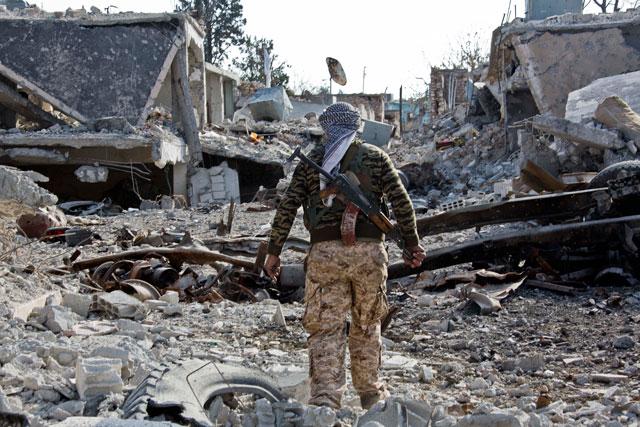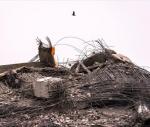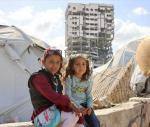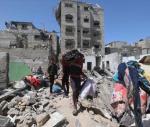You are here
Kurds blame Turkey as suicide bombers hit Kobani
By Reuters - Nov 29,2014 - Last updated at Nov 29,2014

ISTANBUL/BEIRUT — Turkey's main Kurdish party accused the government of turning a blind eye to Islamic State militants on its soil on Saturday after suicide bombers attacked the town of Kobani along its southern border with Syria.
Four IS militants blew themselves up in Kobani, one detonating a car bomb at the Mursitpinar border crossing. At least 30 people were killed in clashes across the town, a monitoring group and local officials said.
The Britain-based Syrian Observatory for Human Rights and a Kurdish official in the town, Idris Nassan, said the vehicle used in the dawn car bombing had come from Turkish territory.
Prime Minister Ahmet Davutoglu's office said in a statement that while IS had attacked several parts of Kobani, including Mursitpinar, it was "definitely a lie" that the vehicle used in the bombing had crossed from Turkey.
Kurdish militia have been holding off IS fighters for more than two months in Kobani, known as Ain Al Arab in Arabic. Neither side has gained a decisive advantage despite US-led air strikes meant to push back the Islamist insurgents.
The observatory said a second bomber detonated an explosive vest in the same area, before two more suicide attacks hit the southwestern edge of the town.
Turkey's pro-Kurdish HDP Party said the militants were using state grain depots on the Turkish side of the border as a base from which to attack Kobani and described their presence in an area patrolled by Turkish security forces as a "scandal".
“As we have been pointing out for months, this once more proves that Islamic State is being supported [from within Turkey],” the HDP said in a statement.
Turkey has vehemently denied supporting the jihadists, saying they are also a threat to its own national security. Davutoglu’s office said Turkish security forces had taken “all necessary precautions” along the border.
Ankara has refused to take a frontline role in US-led action against IS, fearing it could strengthen Syrian President Bashar Assad’s forces or Kurdish militias, both of which it sees as a threat.
The stance has infuriated Turkey’s Kurds, prompting violent protests in October in which around 40 people were killed.
The observatory said IS fighters had fired at least 110 shells on Kobani and were bringing in tanks. Two air strikes targeted IS positions to the east, it said.
At least 30 fighters were killed, said Rami Abdulrahman, the observatory’s director. Twenty-one were IS fighters, including the four bombers. The rest were Kurdish forces.
Related Articles
Turkey's main pro-Kurdish party on Sunday pressed Prime Minister Ahmet Davutoglu over whether a probe had been launched into claims that an attack by jihadists on a border post had been launched from Turkish soil.
ANKARA — A suicide bomber attacked Monday a cultural centre hosting anti-Daesh activists in a Turkish town near the border with Syria, killi
Kurdish fighters in the battleground Syrian town of Kobani weathered an onslaught by Islamic State (IS) militants on Tuesday as they waited for promised reinforcements.



















